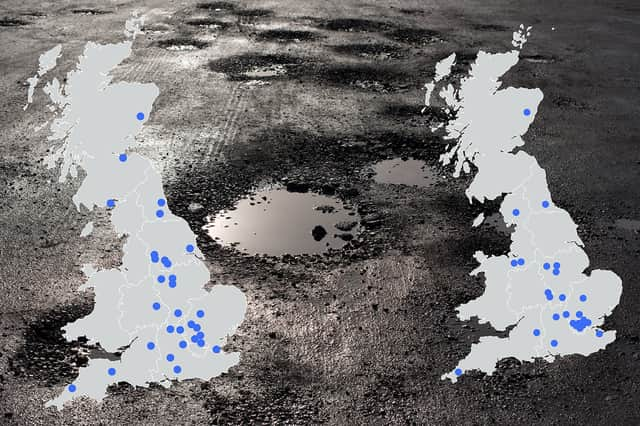UK’s most pothole-plagued councils revealed as authorities spend millions on maintenance


Councils around the country are facing a pothole epidemic, spending tens of millions of pounds a year trying to fix roads as some authorities face hundreds of thousands of reports of problems.
New research has uncovered the councils facing the biggest pothole problems, along with those spending the most and the least on addressing the age-old issue of poor road conditions.
Advertisement
Hide AdAdvertisement
Hide AdCambridgeshire has been identified as the most pothole-ridden region in the country, with almost a quarter of a million potholes reported there in the last four years.
A freedom of information request to every council in the country revealed that Cambridgeshire County Council had identified or been alerted to 240,031 potholes since January 2017, nearly 68,000 more than second-placed Derbyshire, with almost 173,000.
Loading....
The data obtained by comparison site MoneySuperMarket showed that the neighbouring councils in Devon and Cornwall had received reports of 147,700 and 126,500 potholes each in the last four years, ahead of Oxfordshire County Council (110,000).
However, only one of the 10 councils with the most potholes (Buckinghamshire) was among the biggest spenders on repairs.
Advertisement
Hide AdAdvertisement
Hide AdDespite ranking 18th in terms of number of potholes, Wiltshire Council was found to spend the most on repairs, dropping £68.6 million into pothole repairs between 2017 and 2021.
Warwickshire County Council was the next biggest spender, at around £51m, ahead of Cheshire West and Chester (£38.6m), Kent (£33.4m) and Cheshire East (£23.8m).
Loading....
Unsurprisingly, smaller council areas reported fewer potholes, with Bolsover District Council, in Derbyshire, and the Royal Borough of Kensington & Chelsea recording fewer than 200 each (138 and 158 respectively). Kensington & Chelsea also reported one of the smallest outlays on repairs, at £31,000, just ahead of Stockport (£24,000) and Wandsworth (£13,400).
Several other London boroughs with relatively small geographical footprints also reported fewer than 2,000 potholes but Isle of Anglesey (290), Sunderland (320) and Rutland (687) had the next fewest reports.
Advertisement
Hide AdAdvertisement
Hide AdPotholes are a particular hazard during winter as the freezing and thawing of water turns small flaws in the road surface into huge holes. Every year the RAC reports an increase in pothole-related call-outs during winter, with damaged tyres and suspension among the most common problems. The first three months of 2021 saw the equivalent of 52 drivers per day affected by such damage.
Damage caused by potholes costs drivers and councils money. The average cost of repairing a car damaged by a pothole is around £140, according to insurer Admiral and in 2020, councils in England paid out more than £8 million in compensation for damage and injuries caused by them.
Sara Newell, car insurance expert at MoneySuperMarket, commented: “Potholes can be a real menace. Not only are they dangerous but they can also cause serious damage to your car, with wheels, suspension and even body work all at risk from some of the worst.
“The cost of these repairs can be high, so make sure you have comprehensive car insurance and check the small print to see exactly what’s covered in the event of a claim, particularly if you live in an area where potholes are common and road surfaces are in a state of disrepair.
Advertisement
Hide AdAdvertisement
Hide Ad“If you’ve experienced pothole damage but don’t want to claim on your policy, you can also consider making a claim to the relevant authority responsible for maintaining the road where the damage occurred. For example, local authorities tend to be responsible for local roads and B roads, while Highways England is responsible for A roads and motorways.”
